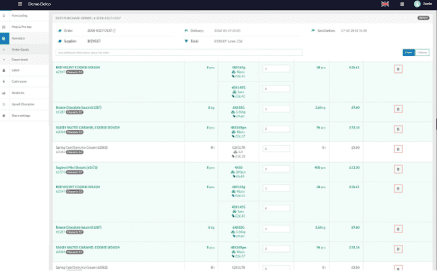Restaurant franchising is rooted in the entrepreneurial spirit that defines hospitality. Adaptive and relatively easy to scale, it’s a model that rewards initiative and innovation. But with flexibility, comes complexity. For those working at corporate level, managing a network of franchises brings with it a myriad of challenges, from balancing brand consistency with operator autonomy, to ensuring good communication and legal compliance.
As we’ll see, many of the hurdles associated with managing franchise restaurants can be easily overcome with a next-gen platform like Syrve. Before we explain how, let’s explore some of the most typical pain points for franchisors. What are the main challenges of managing restaurant franchises?
- Balancing Dish Consistency and Flexibility
- Reconciling Menu Consistency and Variable Business Models
- Ensuring Good Communication
- Collecting Reliable Data
- Avoiding Compliance Issues
- Scaling Tech During Expansion
.png?width=636&height=424&name=1-Incontent(1).png)
Balancing Dish Uniformity and Regional Demand
Unlike traditional chain-based operations, rigid adherence to recipe guidelines isn’t always going to be suitable for franchisees, particularly those that don’t rely on centralised supply chains or broad market appeal. Regional culinary preferences and ingredient availability also need to be taken into account.
This often leads to individual operators adjusting preparation guidelines and tweaking recipes in order to satisfy local demand and ensure supplier consistency. While such measures may result in short term gains, they risk undermining customer trust, diluting brand identity, and ultimately, impacting profitability.
Reconciling Menu Consistency and Variable Business Models
The above principles also apply to menu management, particularly for smaller franchisors that offer individuality as a selling point. Variations in the cuisine being offered by the franchisee as well as locational preferences necessitate tech-driven menu flexibility.
Without it, franchisors with control of estate-wide menu management have to manually communicate price changes and menu updates. The entire process can become an expensive, time-consuming headache, often resulting in delays and inconsistencies. This brings us neatly to communication.

Ensuring Good Communication
Given the decentralised nature of the franchise model, good communication is often a challenge. Some franchisees are responsive and tuned in, others are more impassive or resistant. It’s also the case that for many franchised businesses, local operational concerns will take precedent over wider corporate matters.
Message overload can be a problem too, leading to communications being ignored or buried – this is a common occurrence, particularly for busy franchisees trying to juggle daily operations. A lack of transparent and consistent two-way communication leads to poor execution, inefficiencies and confusion.
Collecting Reliable Data
The disparate makeup of a typical franchise network causes problems when it comes to collecting and analysing data. Operational processes can differ between each franchisee – some may use specific POS terminals, stock control or accounting software. While these in-house solutions might be perfectly effective, if they’re at odds with the kind of tech utilised by other locations, data silos will result.
In some scenarios, underperforming restaurants might also be reluctant to share data for fear of inviting operational scrutiny. Both of these common scenarios lead to fragmented, unreliable data which makes performance analysis difficult, if not impossible.
.jpg?width=624&height=416&name=pots(1).jpg)
Avoiding Compliance Issues
Regulatory compliance is another challenge. Franchisees are of course responsible for their own business affairs - in many instances their corporate overlords have limited control over the day-to-day running of their restaurants. This lack of direct oversight often manifests in poorly enforced training and onboarding processes.
Standards then start to slip in a whole host of operational areas, among them food safety, branding and service. What’s more, with industry pressures being as they now are, franchisees may look for shortcuts and workarounds in order to deal with rising food costs.
In the UK, there have been numerous examples of restaurants underpaying staff, violating food hygiene protocols to speed up service, and using non-approved suppliers for cheaper ingredients. Needless to say, such violations can lead to heavy fines.
Scaling Tech During Expansion
Restaurant franchisors that allow individual stores to use their own tech stacks tend to run into difficulties when trying to open new locations. In store systems comprise numerous components, from POS terminals and inventory to payment processing and delivery platforms. Duplicating and implementing this kind of infrastructure can take weeks.
Even those that already have in place a unified system often find themselves shocked by the costs involved in a new installation. This is especially true of in-house restaurant management systems. The co-ordination, testing and staff training required often results in costly delays.
So how does Syrve help restaurant franchisors to overcome these recurrent problems?

Balancing Dish Uniformity and Regional Demand With Syrve
In terms of dish uniformity, Syrve allows you to store recipes and food prep guidelines in a centralised easy-to-access system location. This includes information about signature dishes, batches, semi-finished products and so on - any changes are instantly updated across all locations.
Variations of a recipe can also be created to accommodate differing regional tastes or supplier availability. Real-time inventory management also helps to balance stock levels, effectively putting an end to last minute dish alterations caused by stockouts.
Reconciling Menu Consistency and Variable Business Models With Syrve
As is the case with recipe control, Syrve simplifies the entire process of menu management. Any price or dish availability changes can be made via a single dashboard with all updates registered in real time. It’s also possible to schedule changes based on demand – an incredibly useful tool for dynamic restaurant pricing. Pricing bands can also be put in place for specific stores as well as specific menu items.
Ensuring Good Communication with Syrve
Syrve’s central dashboard is effectively a data hub from which important information can be gleaned about company news, operational changes, menu updates and promotions. With everything shared in real time, there’s no need to sift through emails or take phone calls. As a result, important communications won’t be missed or ignored, and only the most pertinent information will be provided to staff.

Collecting Reliable Data With Syrve
Syrve’s advanced analytics suite provides detailed, real-time insights and KPIs about every single aspect of your business operations, from POS transactions and stock updates to daily revenue and labour costs. For restaurant franchisors, it’s possible to monitor performance across a multi-site estate as well as compare individual franchises.
The system’s cloud-based infrastructure means that it’s possible to check your figures on mobile and tablet devices from any location with an internet or mobile connection. Such a flexible, data-driven approach can have a significant impact on decision making, which leads to better efficiency and performance.
Avoiding Compliance Issues With Syrve
Dealing with regulatory compliance can be a headache even if you run a single restaurant, let alone a network of them. This is an area which can really benefit from a tech solution like Syrve. Detailed reports enable you to monitor staff behaviours and activities to ensure standards are maintained. Event logs also empower you to act on discrepancies and malpractice quickly. In other words, all operational activities are traceable for multiple venues and for selected businesses.

Scaling Tech During Expansion With Syrve
Syrve is designed to support multi-estate operations such as franchises. Because it’s cloud-based, there’s bulky on-site servers are not necessary. Any new franchisees can be easily added to the system with the click of a few buttons.
The system's tools are also fully integrated – there’s no need to patch together a collection of third party apps. By combining centralised control, real-time visibility and all-in-one operational tools, Syrve is able to reduce the complexities of scaling, allowing you to launch a new franchise with a minimum of fuss.
Learn how Syrve can help you to transform your restaurant franchise operations today!




